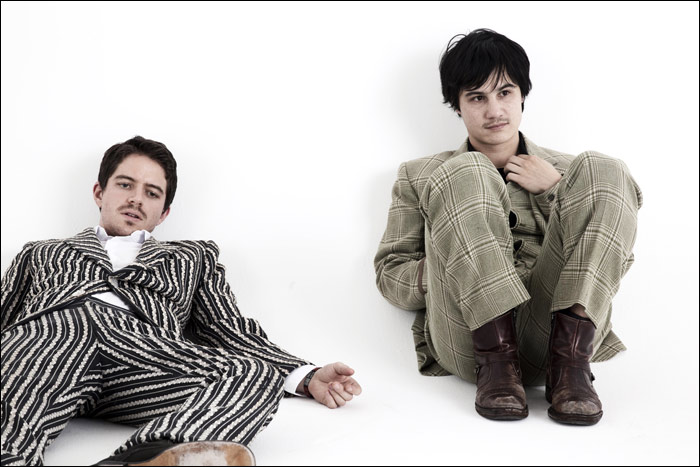
The Ups and Downs of Periodical Insanity
by Luke Winkie
Given the angular tension of the Dodos, it makes a lot of sense they’d be studio-rats. The San Francisco duo of Meric Long and Logan Kroeber are sound addicts, squeezing untouched, otherworldly perspectives out of something as simple as acoustic folk. They obsess in the recording booth, obsess during mixing, obsess during rehearsing, and obsess over the mere concept of the Dodos’ sound. That sort of passion always makes for a good interview, and Long’s wide-eyed enthusiasm was clearly present when I spoke to him on the phone a couple weeks ago. Throughout our talk he would take deep, ruminating pauses as he attempted to articulate the sheer weight of his ambition. No Color, the band’s fourth and latest full-length release, despite whatever anyone might say of its quality, was labored over. And as you’ll read they almost lost their minds in the process.
For the band that emerged in 2005, struck big in 2008, and found themselves written off in 2009, No Color seems to be a statement of purpose, an attempt to regain the buzz that launched Visitor to the front of the pack. After all, two cool critical receptions in a row is suicide in the constantly shifting indie realm. Long kept referring to the “very specific thing” he’s “trying to do with this band.” No Color is meant to be that crystallization, whether it works or not is up to us now.
No Color comes out in just a few weeks. How are you feeling about that?
Meric Long: Yeah, it’s been a long time coming. The record was done back in October, so this is like the moment of truth. I really want to have a good critical response so we have a good touring season. We’ll be starting our tour when the record comes out, and the reviews will really determine how well the tour is going to be. We’ll be touring for three months, and I want those months to be good and exciting. At this point, I just want to get it over with.
The last album did have a weird response. Do you think that informed your creative process going into this one? Was it discouraging?
ML: There was definite disappointment in the way that record was received. Not just that everybody didn’t love that album, but I feel it was misinterpreted. There were some comparisons that I felt were a little unjustified and kind of weird, and the shitty thing about that is when one person prints that response, it tends to get repeated and the music doesn’t get the attention it deserves. It gets brushed off. That was disappointing. There’s a very specific thing we try do with this band—all of our records are trying to do it—but we made sure on No Color that we were very forthright in what we wanted the sound to be.
Your agenda as it were?
ML: Yeah, we definitely went into the studio much more focused than on the last two albums. It was like “there are certain things I want to have happen on this record.” That was our mindset.
What made you want to go back to John Askew?
ML: We had talked to John about doing some recording—not even about a record, just some studio time—and as we were talking it became clear that we were all on the same page with the vision. So we booked two months of studio time, and we were pretty sure we were going to make a record. Going back to John just seemed exciting at the time. We did two records with him, and after going to someone else, it was clear that we really get along with him. We were in the same studio with the same people, and I had learned a lot more about recording especially after working with Phil (Ek). We just really knew the sound we were going for.
How did these sessions compare to the other ones?
ML: The whole record started off the same way we did Visitor, in that we took the songs on the road. We were playing support for the New Pornographers, so we had the freedom to try new stuff out. When we went into the studio, we had a lot of songs that were mostly finished and very well rehearsed, but still needed work. So the first couple weeks we just recorded the songs as we would play them live, just to benefit off of that tightness. Our last show was only a day before the studio time, so we went straight from performing to recording. Over the two months, we had these skeletons of songs that we were filling out. We got to embellish all the parts and record a lot of extra stuff. We had a whole string orchestra, Neko Case came in and sang for a bit, and on top of that we had the time to evaluate everything. In the past, the mixing process would go pretty fast, but this time around it was a total democracy, Logan, John and I listening to the mixes over and over again, coming back with new ideas. It definitely got to the point where we completely lost our minds. The level of insanity and coffee consumed and the time spent brooding over shit—there’s some video footage of us later in the recording and we’re just all over place, like not even knowing what we’re listening to anymore.
Was it a loving insanity or was there a little animosity?
ML: It was mostly loving, but there were definitely moments where we had to reel each other in. The thing about John is that he is basically part of the band. I was playing with him before I even played with Logan, and he helped us figure out how to record this band because it’s kind of a weird band to record. He’s been part of us for so long, he’s not really a guy to defer to. He’s just as emotionally attached to and enthusiastic about the songs as we are—and just as crazy. The thing with producers is that they kind of fill the role of safety blanket, the guy who knows best. We call the studio “the submarine.” We submerge and don’t speak with the outside world for a couple months.
Was there anyone there to moderate it?
ML: Not at all. When an outsider arrived, we didn’t even know how to communicate. It was always like, “Who is this alien?”
Let’s talk about Neko for a bit. How did she get involved in the recording?
ML: It just kind of happened. She knew we were recording in Portland and said, “I love Portland!” We asked if she wanted to sing, and she did. That was that. She was there for a weekend and cranked out a bunch of stuff. When she arrived, we had already been working on the record for a month and hadn’t seen anyone else. So when she showed up, we were like, “Who is this strange woman?” It was good that she came and shook things up, because we needed that.
